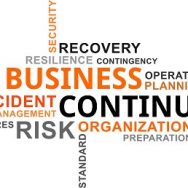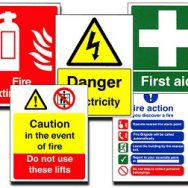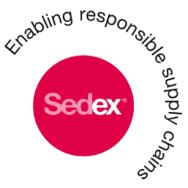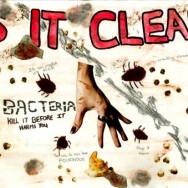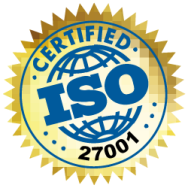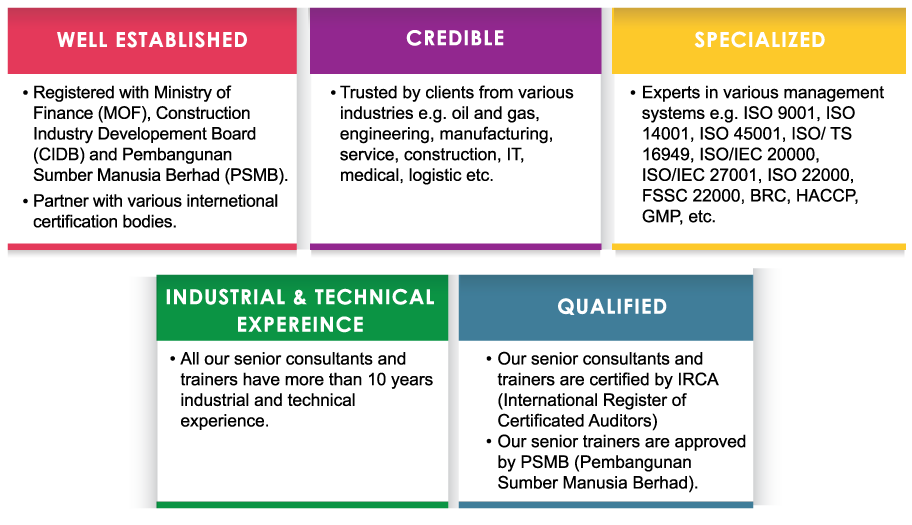ISO Standards
ISO 22301 Business Continuity Management System
About ISO 22301 Business Continuity Management ISO 22301 is an international network standard for Business Continuity Management. The standard provides a framework to plan, implement, operate, monitor, review, maintain and continually improve a Business Continuity Management System (BCMS). Regardless of your organisation’s size, nature of business or sector, it is vulnerable to many forms of disruptions. Natural disasters, political disturbances, terrorism and technology failure may occur at any time and lead to business disruptions. Benefits of ISO 22301 Business Continuity Management Identify and manage current and future threats to your business.Minimise the impact...
Read MoreISO 37001 Anti-Bribery Management System
Introduction ISO 37001:2016 The ISO 37001:2016 specifies requirements and provides guidance for establishing, implementing, maintaining, reviewing and improving an anti-bribery management system. The system can be stand-alone or can be integrated into an overall management system. ISO 37001:2016 is applicable only to bribery. It sets out requirements and provides guidance for a management system designed to help an organization to prevent, detect and respond to bribery and comply with anti-bribery laws and voluntary commitments applicable to its activities. ISO 37001 is based on a four-step model and aligned with the ISO 19600 standard for Compliance Management Systems:...
Read MoreISO/IEC 17025 Testing and Calibration Laboratories
Introduction ISO 17025 ISO/IEC 17025 specifies the general requirements for the competence to carry out tests and/or calibrations, including sampling. It covers testing and calibration performed using standard methods, non-standard methods, and laboratory-developed methods. It is applicable to all organizations performing tests and/or calibrations. This includes all types of laboratories, whether they be owned and operated by government, industry or, in fact, any other organization. The standard is also useful to universities, research centres, governments, regulators, inspection bodies, product certification organizations and other conformity assessment bodies with the...
Read MoreMSPO Malaysia Sustainable Palm Oil Certification
MSPO Being the second largest producer of palm oil in the world, it is only natural for Malaysia to be under the radar of environmentalists and green campaigners regarding the production of palm oil in a sustainable manner. The MSPO Certification Scheme is the national scheme that has been developed to provide assurance that the management of oil palm cultivation and production of palm oil and palm oil products in Malaysia are carried out in a responsible manner, and are not limited to just applying the standard good agricultural practices. The MSPO Certification Scheme also ensures that people who work in plantations, smallholdings and palm oil processing facilities...
Read MoreIntegrated Management Systems (IMS)
An integrated management system (IMS) would means combination ofthe organization’s various components into one system for easier management and operations. Example Quality, Environmental, and Occupational Health and Safety management systems can be combined and managed as an Integrated Management System, or Quality with Food Safety Management System and so on. Integrated Management Systems is not separate systems that are just joined together, rather they are integrated where similar processes are seamlessly managed and implemented to avoid duplication. Benefits of the Integrated Management System (IMS) Improve organization’s performance Improve operational efficiency...
Read MoreISO/TS 16949 Automotive Industry Quality Management Systems
ISO/TS 16949, in conjunction with ISO 9001, defines the quality management system requirements for the design and development, production and, when relevant, installation and service of automotive-related products. ISO/TS 16949 is applicable to sites of the organization where customer-specified parts, for production and/or service, are manufactured. Supporting functions, whether on-site or remote (such as design centres, corporate headquarters and distribution centres), form part of the site audit as they support the site, but cannot obtain stand-alone certification to ISO/TS 16949. ISO/TS 16949 can be applied throughout the automotive supply chain....
Read MoreISO 45001 Occupational Health & Safety Management Systems Awareness
ISO 45001:2018 replaces OHSAS 18001:2007 as the globally recognized occupational health and safety management system certification standard. While it is similar to OHSAS 18001, the new ISO 45001 standard adopts the Annex SL top-level framework of all new and revised ISO management system standards Transition from OHSAS 18001 to ISO 45001 ISO 45001 is anticipated to replace OHSAS 18001 over three years following its publication. It uses the management system standard structure guideline Annex SL to allow for simplified integration with other management system standards, such as ISO 9001 and ISO 14001. How to make the transition? Obtain a copy of ISO 45001:2018. Identify...
Read MoreSEDEX Supplier Ethical Data Exchange
SEDEX is a non-profit membership organisation dedicated to driving improvements in ethical and responsible business practices in global supply chains. Since 2004, over 30,000 organizations around the world have made this their platform of choice, making SEDEX the largest collaborative platform for sharing ethical supply chain data, thus providing an innovative and effective supply chain management solution. SEDEX has 2 main aims: to ease the burden on suppliers facing multiple audits, questionnaires and certifications to drive improvements in the ethical performance of global supply chains. SEDEX requirements cover 4 core areas: Labour Standards Health and Safety The...
Read MoreISO 50001 Energy Management System
ISO 50001 Using energy efficiently helps organizations save money as well as helping to conserve resources and tackle climate change. ISO 50001:2011 supports organizations in all sectors to use energy more efficiently, through the development of an energy management system (EnMS). The standard provides a framework of requirements to increase the efficient use of energy and continually improve energy management. It can be implemented individually or integrated with other management system standards. The main requirements for Energy Management System consist of: 4.1 General requirements 4.2 Management responsibility 4.3 Energy policy 4.4 Energy Planning 4.5 ...
Read MoreISO 22000 Food Safety Management System
ISO 22000 was released on June 19 2018, applies the ISO High Level Structure (HLS), common for all ISO standards. ISO 22000:2018 can help organizations demonstrate compliance with applicable statutory and regulatory food safety requirements. It can also better position organizations towards seeking certification or registration of its FSMS by an external organization. Similarly, it is useful in making a self-assessment or self-declaration of conformity. As it follows the same High Level Structure (HLS) structure as other widely applied ISO standards, such as ISO 9001 and ISO 14001, it will be easier to integrate with other management systems. This document specifies...
Read MoreISO 27001 Information Security Management System
ISO 27001 The new ISO 27001:2013 (released in September 2013) allows you to demonstrate to existing and potential customers, suppliers and shareholders the integrity of your data and systems and your commitment to information security. It also allows you to enforce information security and reduce the possible risk of fraud, information loss and disclosure. The standard is based on 7 major requirements, i.e. Clause 4: Context of the Organization Clause 5: Leadership Clause 6: Planning Clause 7: Support Clause 8: Operation Clause 9: Performance Evaluation Clause 10: Improvement Incorporating the new revision are improvements to the security controls to deal with current...
Read MoreISO 20000 Information Technology Service Management System
ISO/IEC 20000-1:2011 is an IT service management system (SMS) standard. It specifies requirements for the service provider to plan, establish, implement, operate, monitor, review, maintain and improve an SMS. The requirements include the design, transition, delivery and improvement of services to fulfil agreed service requirements, i.e. Clause 4: Service management system general requirements Clause 5: Design and transition of new or changed services Clause 6: Service delivery processes Clause 7: Relationship processes Clause 8: Resolution processes Clause 9: Control processes Benefits of ISO 20000 Compatible with ITIL to support continual improvement Develop IT...
Read More

